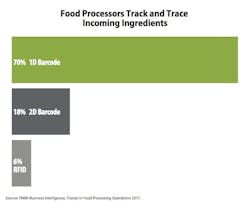1D Barcodes Anchor Food Track and Trace Practices
Though popular with their peers in the pharmaceutical industry for serialization, less than a fifth of food processing companies use 2D barcodes for track and trace, according to a survey from PMMI Business Intelligence, Trends in Food Processing Operations, 2017. Though 2D codes hold more information—which some food manufacturers are using to expand consumer engagement for contests, club memberships, etc.—70 percent of the food processors surveyed use 1D codes for track and trace.
Even fewer food processors rely on RFID, once thought to be the future of traceability. The 6 percent of respondents using RFID for food tracking employ it internally or at the carton level. Some of the responding companies are still testing RFID for traceability.
For the most part, 1D codes provide the information needed. “We use 1D barcodes and can trace fruit back to the field,” noted a director of engineering at a frozen fruit operation.
An engineering manager said that at his dairy they “mostly use 1D barcodes to track large bulk shipments through the transportation chain of custody.”
All incoming ingredients are dated with lot codes. In most cases, these are 1D barcodes that are scanned as they enter the plant. This data is linked with internal software intelligence systems and they can then be traced through all phases of processing and packaging.
To read the full report, or to get more information on pharma track and trace and the use of 2D barcodes, explore PMMI Business Intelligence reports online.

